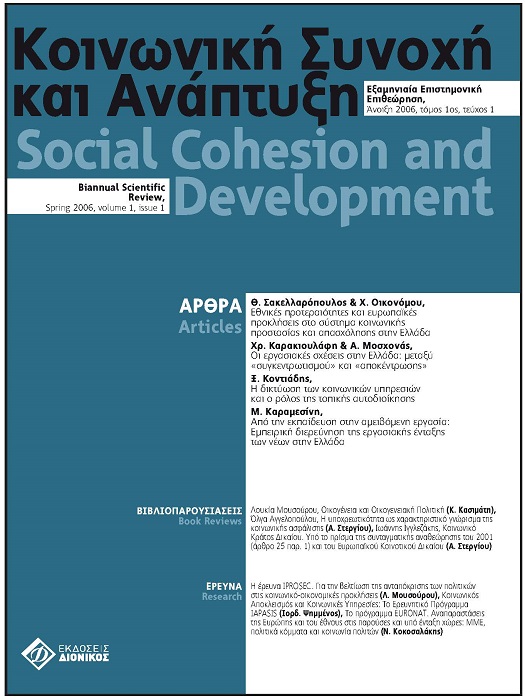From education to paid employment: Empirical investigation of the labour market integration of youth in Greece

Abstract
The paper empirically investigates the transition of youth from education to work in Greece by using a macroeconomic and dynamic approach. It examines in particular the labour market integration of young graduates of the year 1999
by educational attainment level and gender, as well as the difficulties they had in stabilizing in employment during 2000-2005. The paper also discusses the impact of the economic context at the moment of graduation and during the first years after labour market entry by comparing employment performance of the 1994, 1996, 1998, 2000 and 2002 cohorts, one, three and five years after graduation. The methodology used for the empirical analysis consists of the creation of pseudopanels and the estimation of a number of indicators of labour market integration for consecutive years.
Article Details
- How to Cite
-
Καραμεσίνη Μ. (2016). From education to paid employment: Empirical investigation of the labour market integration of youth in Greece. Social Cohesion and Development, 1(1), 67–84. https://doi.org/10.12681/scad.9004
- Issue
- Vol. 1 No. 1 (2006)
- Section
- Articles

This work is licensed under a Creative Commons Attribution-NonCommercial-ShareAlike 4.0 International License.
Authors who publish with this journal agree to the following terms:
- Authors retain copyright and grant the journal right of first publication with the work simultaneously licensed under a Creative Commons Attribution Non-Commercial License that allows others to share the work with an acknowledgement of the work's authorship and initial publication in this journal.
- Authors are able to enter into separate, additional contractual arrangements for the non-exclusive distribution of the journal's published version of the work (e.g. post it to an institutional repository or publish it in a book), with an acknowledgement of its initial publication in this journal.
- Authors are permitted and encouraged to post their work online (preferably in institutional repositories or on their website) prior to and during the submission process, as it can lead to productive exchanges, as well as earlier and greater citation of published work (See The Effect of Open Access).


